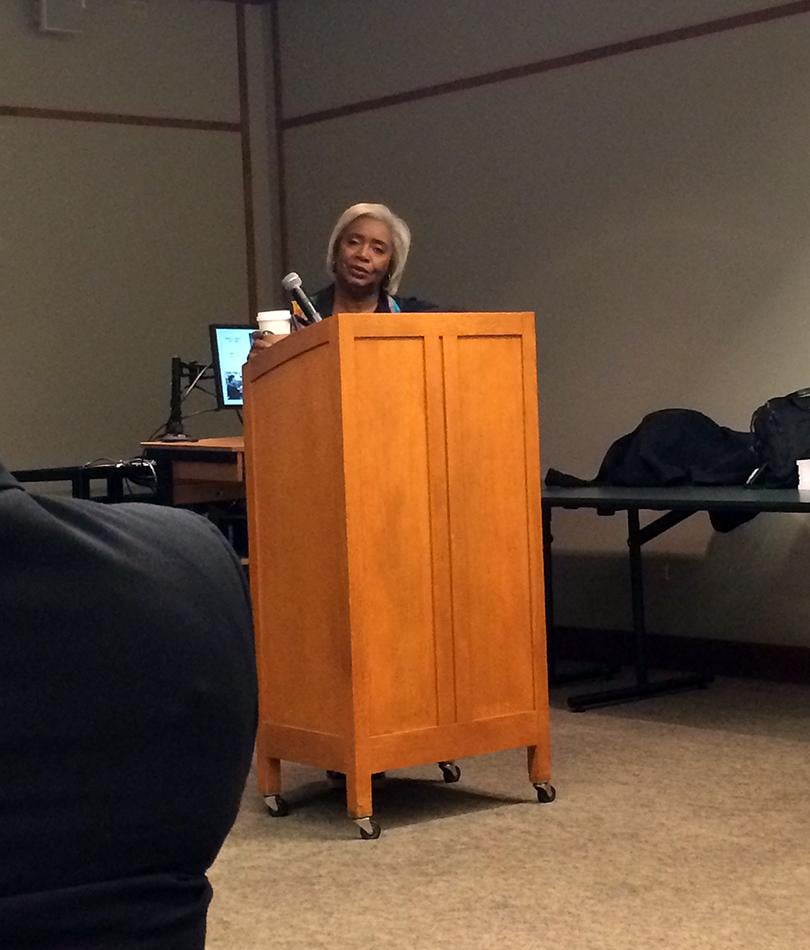Northwestern prof discusses black Chicago renaissance
Paige Leskin/The Daily Northwestern
Darlene Clark Hine, professor of African American studies and history, gives a talk on her book “The Black Chicago Renaissance” at Evanston Public Library on Thursday evening. Hine discussed a Chicago cultural movement in the 20th century that rivaled the Harlem Renaissance in significance.
April 25, 2014
As part of an initiative to expand programming on African American history beyond February, the Evanston Public Library hosted a Northwestern professor on Thursday night to discuss the little-known “Black Chicago Renaissance” of the 20th century.
African American studies Prof. Darlene Clark Hine addressed an audience of more than 50 people about “The Black Chicago Renaissance,” an anthology of essays she edited.
Her book, which she started researching 14 years ago, details a cultural movement in Chicago from 1930 through the 1950s, one she said easily rivals the 1920s Harlem Renaissance in importance. Both were significant and had a major impact on black culture, but the one in Chicago has never been referred to as a “renaissance,” she said.
“You might not have heard about it, but it doesn’t mean it didn’t happen,” she said. “Something happened in Chicago, and it was decidedly a working-class movement.”
Hine said the Great Migration, which brought a multitude of black Americans to the Chicago area, played a major role in starting the renaissance.
Their immediate political engagement turned to the creation of desegregation movements and conversation of increased rights for black Chicagoans.
“When you put people together … they can be very disruptive of the status quo,” she said. “There was nothing like this in Chicago before.”
She named a list of prominent black Americans that included musicians, artists and scholars who all helped cause societal and cultural change, she said.
“African Americans are no longer bullied to ride in the back of the bus,” Hine said. “The lesson of the renaissance is that it helped African Americans realize their fullest potential.”
Although there were similarities between the renaissances in Chicago and New York City, Hine made the distinction that the black artists and workers in Chicago were not separated into different social classes. They were a unified people who wanted to stick together, she said.
“They were creating this art with the workers in mind,” Hine said. “It was important for the art to represent and to also be accessible to everyday ordinary working class black people. It intensified and deepened the connections and links in the community.”
Hine’s talk was part of the library’s program “11 Months of African American History,” which started in March. The series, which features an interactive event each month, was organized to provide discussion of African American culture for the Evanston community throughout the year.
(Evanston Public Library to launch ’11 Months of African American History’)
“It seems very unrealistic and unfair to try to cram an entire program into just one month,” said Lesley Williams, EPL’s head of adult services.
Williams said the idea for such a series came to her after observing the superficiality of other programs that tried to squeeze programming into a single month. Other library programs focused on few key time periods, like the Civil Rights Movement — only the tip of the iceberg that is African American history, Williams said.
Hine was added as a contributor to the series for her unique perspective on a more local African American history, Williams said. The librarian touted Hine as “one of the most prolific scholars” of African American history, making her a critical addition to the program.
Hines said the event was sponsored by the Alice Kaplan Institute for the Humanities at NU, which paid for dozens of copies of Hine’s book to be available for attendees.
Email: [email protected]
Twitter: @paigeleskin


